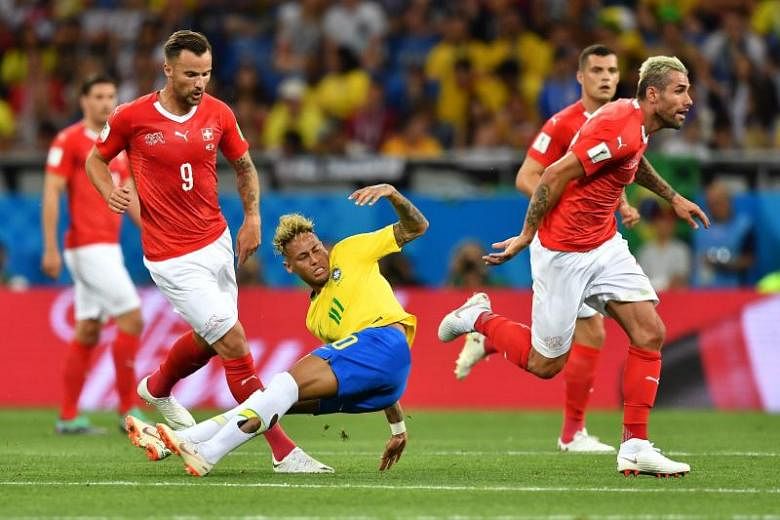His full fitness is in doubt but never his swagger and you can see it in his back-heel on Sunday against Switzerland. It is almost carelessly done, with a coating of conceit, just as it should be. As if the World Cup pitch is just a Sao Paulo lane, but with more spectators.
Every Neymar back-heel matters in a footballing world that's more prosaic than poetic. Once upon a time, wrote Alex Bellos in his lovely book Futebol, Socrates' back-heel was so fine that Pele said he "played better backwards than most footballers did forwards".
Stuff happens, or is supposed to, when Brazil play. Football must shine. And for 15 to 17 minutes against Switzerland they are fast and fluid, doing what the best sport is supposed to, which is to not just register a score but please the eye.
Brazil can't sustain it and neither can Neymar. And all their little offerings - the 'keeper's flick as a Swiss player rushes at him; a pass given off the chest; a small piece of Willian trickery on the run - are just stylish streaks of paint but never amounting to anything near a masterpiece.
It's understandable, it's a first match, a metatarsal tester, and anyway Brazil's silk has come a little unravelled. In 1994, 1998, 2002, they reached three straight Cup finals (winning two) but since then have made one semi-final in three Cups. Style is hard to come by when you don't have the substance. And yet, because longing is not a logical thing, still we wait for Brazil to gleam.
It's scarcely been a dull Cup, not with Spain-Portugal's gunfight and Mexico pressing like one of their great boxers, but largely football is a game that's turned effort and organisation into its highest virtue. It's how smaller nations bridge the gap and to not recognise the discipline of Switzerland and Iceland would be an unforgivable snobbery.
Persistence is its own art form, but sport also needs effrontery and flair else, like tennis on some days, it becomes a workplace of clones. As the great novelist Saul Bellow wrote: "The same things are done by us, over and over, with terrible predictability. One may be forgiven, in view of this, for wishing at least to associate with beauty."
Some people see art as an unaffordable luxury in the pursuit of winning, but some of us prefer winning to come, now and then, with a little cheek, a dash of style and a slice of risk. I would have travelled continents to watch the late Seve Ballesteros get on his knees and hit a golf shot under the trees and would skip a week's work to see V.V.S. Laxman do stuff with a cricket bat that is usually found in Musketeer movies.
The imagination of these athletes can't be distilled into statistics. Of course, numbers matter and it's fascinating to view heat maps and interpret performances through passes made and kilometres run. But that's not the stuff you swoon at.
And so you might calculate how high Michael Jordan rose, and how long he stayed in the air, but his flight paths to the basket, now that was poetry. No wonder Frank Deford would write in Sports Illustrated: "(Jordan) made sport into art in a way that we really haven't seen, haven't admired, quite so, since the Greeks chose athletes, foremost, to decorate their amphoras."
To be fair, football is played so fast these days, space closed so quickly, there barely seems time to invent. And yet great athletes always have time, to run courageously at defenders like Ronaldo and Messi and to thread 25-metre passes through a thicket of legs like Andres Iniesta.
But Brazil carry a special burden of beauty and even though it seems unfair we must always expect from them. Because if one day we gave up on them, and didn't expect beauty, and discarded romance, imagine then what football would have lost?
So let's wait for Brazil, and hope referees protect Neymar, and till then let's remember who they were and rewind to a moment from the 1958 Cup which Ruy Castro describes in his book, Garrincha.
Having left another bewildered Soviet defender on the ground, the mad genius "put his foot on the ball and with his back to the player offered his hand to help him up". Then Garrincha lifted him up and took off running. In search, one presumes, of another dribble.


